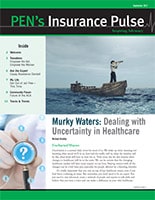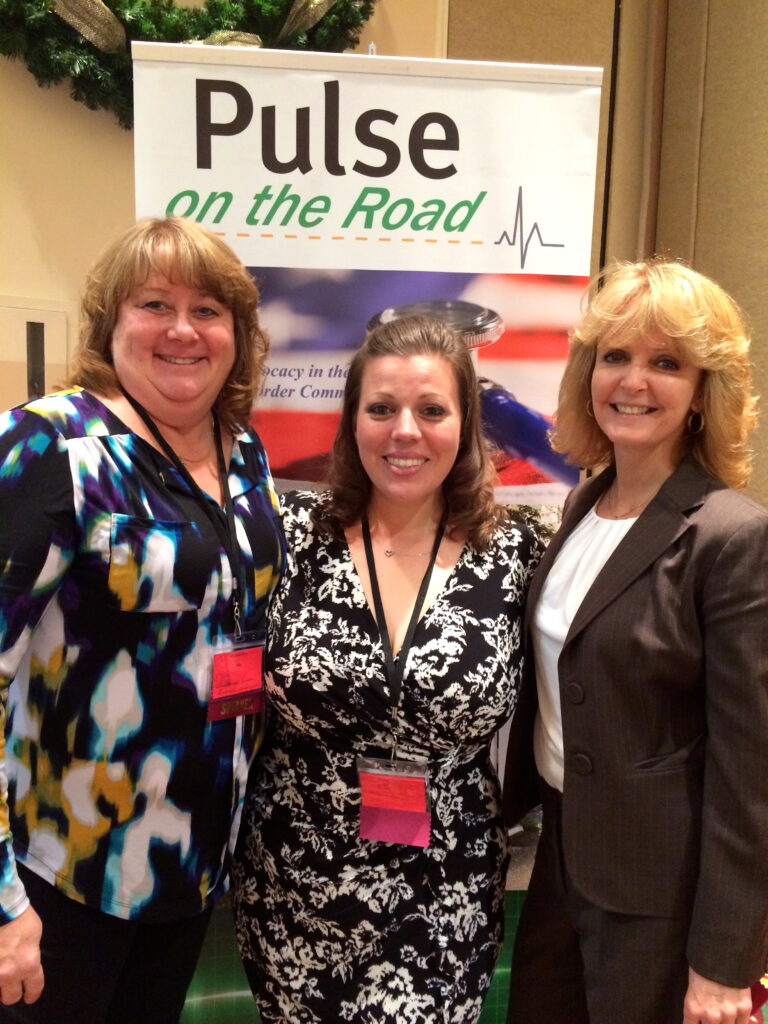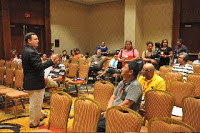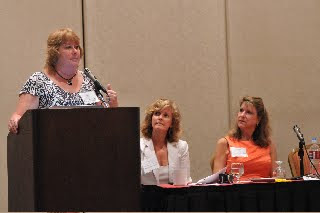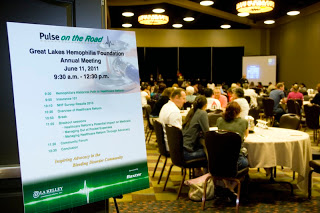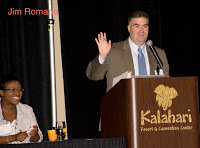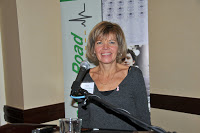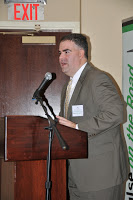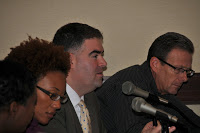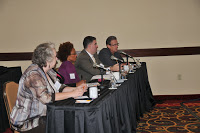Laurie Kelley
December 12, 2011
Myrtle Beach, that is, location of the final Pulse on the Road for 2011. I traveled to South Carolina to Hemophilia of South Carolina’s annual meeting and to present POTR, an interactive health insurance symposium sponsored by Baxter Healthcare Corporation.
What a wonderful hemophilia organization! No surprise there—almost as soon as you land in South Carolina, you feel a difference. A genuine warmth and friendliness, with southern hospitality, that you just don’t get in many northern states. South Carolinians really know how to make you feel at home. 
And what a rapt audience. We presented from 9 am until noon, a long time to discuss health insurance, but the families were attentive, engaged and asked many questions. After a warm introduction from the elegant Ms. Vidalia McTeer, I launched into the history of the hemophilia community as relates to health insurance, especially why the Golden Age of having whatever you want—product choice, access to many providers, and limited interference from payers— is coming to a close. Some points were new to this community, such as the rise of PBMs—an important player, with the current attempt by Express Scripts to buy Accredo.
Next, Marvin Poole, senior manager of Reimbursement and State Advocacy, Baxter Healthcare, gave a review of common and important health insurance terms, such as “grandfathered” and “donut-hole.” These are must-knows now that healthcare reform is upon us.
Ruthlyn Noel, manager of Public Policy, National Hemophilia Foundation (NHF), gave the results of a joint survey by NHF and HFA, to assess what consumers know about health insurance and healthcare reform. The results overall are encouraging!
Then, Kelly Fitzgerald, associate director of Government Relations, Patient Services, Inc. (PSI, gave the keynote speech on healthcare reform—the Affordable Care Act (ACA). The big year is 2014, folks—know what’s happening then! 

We spiced up the talk by offering a quiz at the end of each lecture, and offering $20 to whoever gave the right answer! And why not? This is all about teaching the community how to safeguard our precious dollars, our disposable income.
Three breakout sessions allowed families to sit in more intimate setting and learn more about Medicaid, Advocacy and Out of Pocket Costs. Jennifer Meldau, RN and Nurse Coordinator at Palmetto Health, the SC hemophilia treatment center, joined us to help give the audience more specific information about South Carolina Medicaid.
Finally, we all reconvened for the Community Forum, a Q&A. Questions focused on genetic transmission of blood disorders, Tricare, advice on young adults exiting their parents’ insurance, and the likelihood of ACA being repealed by the Supreme Court. Fantastic questions from a fantastic audience.
I was very fortunate to sit with a few families individually and hear about their struggles, challenges and even triumphs. James, Susie, Sandy, April… all unique but with a common theme of bleeding disorders. There’s only one HTC in South Carolina, so many parents use local healthcare services if it’s not a life threatening bleed. But most doctors don’t know much about hemophilia—parents can actually know more than the doctor about treatment! Many South Carolina families have learned on the spot, in the midst of a crisis, how to find their voice and speak up. I was really proud to hear so many stories of these true advocates.


The most amazing thing about South Carolina is that the chapter has been run for 40 years by Roberta and Vic Fisher, a dynamic duo, and is all volunteer! Kudos to Sue Martin and the Fishers, and their team for organizing one of their biggest annual meetings. I miss South Carolina already and look forward to returning again. I hope though not for insurance reform education—wishful thinking that our government will have a breakthrough.
(Photos: Kay Scott)
Great Book I Just Read
The Water is Wide by Pat Conroy

Conroy is one of my favorite writers. In this, his first book, he provides a memoir of his first year out of college in the late 1960s, teaching mostly illiterate black children on neglected Daufuskie Island (which he calls Wamacraw), off the coast of South Carolina. Idealistic, young, confident and white, he soon learns his students are mostly illiterate, don’t know what country they live in, who the president is or even how to write. Shocked, he throws himself into the job with gusto and humor, winning his suspicious students over. His writing is superb, and the story is captivating, funny, sad and marvelous. When he learns the kids have never been off the island, or celebrated Halloween, he orchestrates a wonderful sleepover on the mainland and a Halloween outing. He refuses to use the switch on the children, and encourages them to speak up and speak out. His unorthodox techniques and agenda get him reprimands, negative attention and roadblocks from the school system, where he sees territorialism, jealousy and hypocrisy. The children are caught between a culture of dependency, fear and submissiveness from their depressed surroundings and often alcoholic or abusive parents, and a school board more interested in keeping them repressed and isolated. Conroy stands out as their champion; he leaves his mark on these impoverished children, while also growing up himself, and learning the ways of their unique island culture, and an indifferent outside world. Five stars
